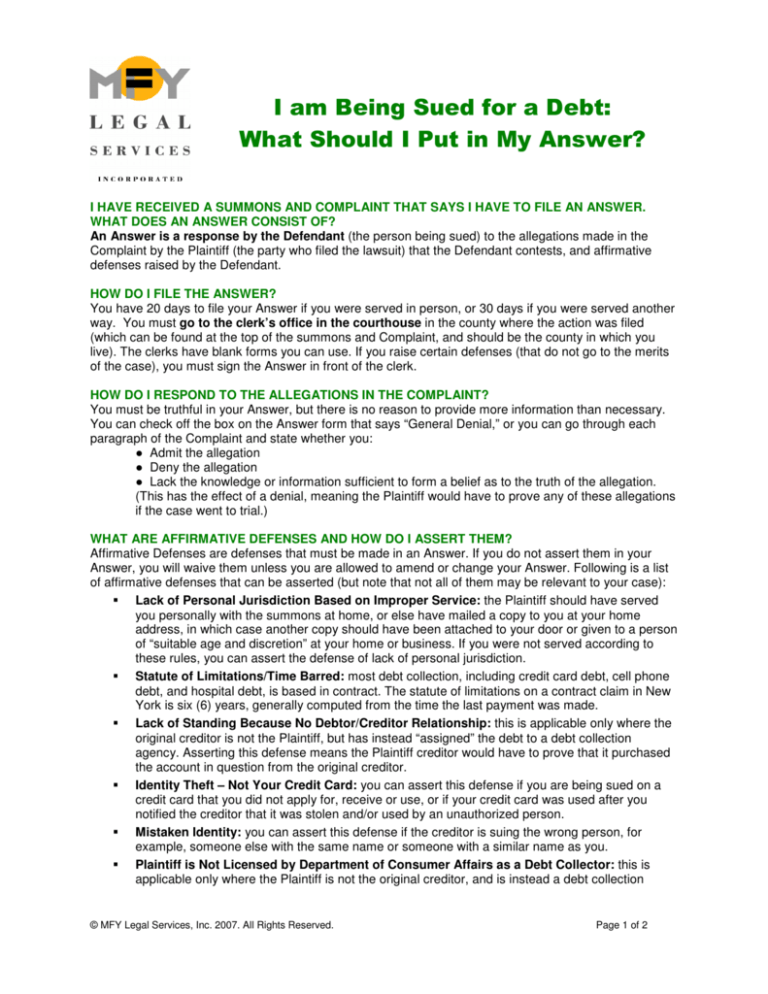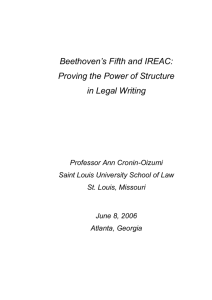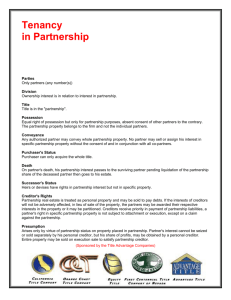
I am Being Sued for a Debt:
What Should I Put in My Answer?
I HAVE RECEIVED A SUMMONS AND COMPLAINT THAT SAYS I HAVE TO FILE AN ANSWER.
WHAT DOES AN ANSWER CONSIST OF?
An Answer is a response by the Defendant (the person being sued) to the allegations made in the
Complaint by the Plaintiff (the party who filed the lawsuit) that the Defendant contests, and affirmative
defenses raised by the Defendant.
HOW DO I FILE THE ANSWER?
You have 20 days to file your Answer if you were served in person, or 30 days if you were served another
way. You must go to the clerk’s office in the courthouse in the county where the action was filed
(which can be found at the top of the summons and Complaint, and should be the county in which you
live). The clerks have blank forms you can use. If you raise certain defenses (that do not go to the merits
of the case), you must sign the Answer in front of the clerk.
HOW DO I RESPOND TO THE ALLEGATIONS IN THE COMPLAINT?
You must be truthful in your Answer, but there is no reason to provide more information than necessary.
You can check off the box on the Answer form that says “General Denial,” or you can go through each
paragraph of the Complaint and state whether you:
● Admit the allegation
● Deny the allegation
● Lack the knowledge or information sufficient to form a belief as to the truth of the allegation.
(This has the effect of a denial, meaning the Plaintiff would have to prove any of these allegations
if the case went to trial.)
WHAT ARE AFFIRMATIVE DEFENSES AND HOW DO I ASSERT THEM?
Affirmative Defenses are defenses that must be made in an Answer. If you do not assert them in your
Answer, you will waive them unless you are allowed to amend or change your Answer. Following is a list
of affirmative defenses that can be asserted (but note that not all of them may be relevant to your case):
Lack of Personal Jurisdiction Based on Improper Service: the Plaintiff should have served
you personally with the summons at home, or else have mailed a copy to you at your home
address, in which case another copy should have been attached to your door or given to a person
of “suitable age and discretion” at your home or business. If you were not served according to
these rules, you can assert the defense of lack of personal jurisdiction.
Statute of Limitations/Time Barred: most debt collection, including credit card debt, cell phone
debt, and hospital debt, is based in contract. The statute of limitations on a contract claim in New
York is six (6) years, generally computed from the time the last payment was made.
Lack of Standing Because No Debtor/Creditor Relationship: this is applicable only where the
original creditor is not the Plaintiff, but has instead “assigned” the debt to a debt collection
agency. Asserting this defense means the Plaintiff creditor would have to prove that it purchased
the account in question from the original creditor.
Identity Theft – Not Your Credit Card: you can assert this defense if you are being sued on a
credit card that you did not apply for, receive or use, or if your credit card was used after you
notified the creditor that it was stolen and/or used by an unauthorized person.
Mistaken Identity: you can assert this defense if the creditor is suing the wrong person, for
example, someone else with the same name or someone with a similar name as you.
Plaintiff is Not Licensed by Department of Consumer Affairs as a Debt Collector: this is
applicable only where the Plaintiff is not the original creditor, and is instead a debt collection
© MFY Legal Services, Inc. 2007. All Rights Reserved.
Page 1 of 2
agency. You can call the Department of Consumer Affairs at 212-487-4110 or check online at
http://www.ci.nyc.ny.us/html/dca/html/home/home.shtml to find out if a debt collector is licensed.
Plaintiff Does Not Allege Its License Number in the Complaint: again, this applies only where
the Plaintiff is not the original creditor, and it does not put its license number in the Complaint.
SHOULD I PUT ANYTHING ELSE IN MY ANSWER?
If you cannot afford to pay the debt, you can state this in your Answer for informational purposes. If your
only source of income is social security, social security disability, supplemental security income, public
assistance, or another type of public benefit, you can also state for informational purposes that your only
source of income is exempt from collection.
WHAT HAPPENS AFTER I FILE MY ANSWER?
When you file your Answer, the clerk will give you a date to come back to court and a date by which you
must serve a copy of your Answer on the Plaintiff’s attorney. You can serve the Plaintiff’s attorney by
mailing a copy of your Answer (the clerk will give you two copies) via certified mail. Be sure to keep the
receipt from the mailing, and be sure to bring it with you to court on your court date to prove that you
served the other side. Finally, it is very important that you show up at court on the correct date.
© MFY Legal Services, Inc. 2007. All Rights Reserved.
Page 2 of 2



![[2012] NZEmpC 75 Fuqiang Yu v Xin Li and Symbol Spreading Ltd](http://s3.studylib.net/store/data/008200032_1-14a831fd0b1654b1f76517c466dafbe5-300x300.png)






